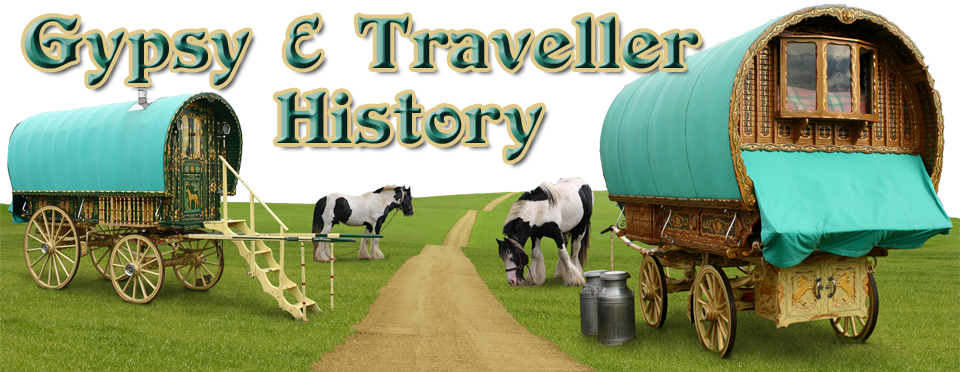The Old Way of Life
Gypsy families roamed the roads in small family groups, usually one wagon on its own, but sometimes two or three would travel together. They had their regular stopping places, very often in otherwise little used grassy lanes, and it was here that they would meet up with their friends and relations. On stopping, the first thing to do was to find food for the horse. If grass was plentiful he could graze by the roadside, but if grass was short a suitable field had to be found. This had to be spied out before dark, to make sure that there were no other cattle or horses in it, and that all gates are shut. If there were other horses in the field it may prove difficult to catch your own, as this had to be done before daylight when the farmer awoke. Likewise, your horse could not be put to graze before dark. This practice was known as “Pooving the Gry”.
They did not generally travel great distances, for instance, the New Forest Gypsies would not generally travel much further than Southampton or Salisbury – sometimes going as far afield as Kent for the hop-picking season. Those that followed crafts such as pot mending and knife grinding would have a regular route, perhaps calling on the same house twice a year. Local people would put their pots aside to wait for them when they came. Those who had goods for sale, rather than offering a service, (such as the basket-maker and peg maker), would perhaps call more often and would also sell to the shops in villages and towns. The larger shops would place a regular order with the Gypsies. Some townspeople would not give their knives to Gypsies to be sharpened, and took them to the shop - little did they know that it was very often a Gypsy that sharpened them.
There were always a high number of Gypsies in the New Forest area, because the Forest itself was ideally suited to them. There was plenty of grazing for their horses, an abundance of wood for their crafts and fires, a plentiful supply of rabbits and pheasants, (and perhaps even the odd deer) as well as holly and Christmas trees to be cut and sold – the heath-land was ideal for providing camping sites, and there was the opportunity for plenty of horse dealing with the New Forest ponies.
In addition, there was always a plentiful of soft fruit grown in the area and this offered opportunities for employment. People did travel further afield during hop picking time, and the New Forest Gypsies would often travelled to Kent when the strawberry picking and the local harvest were over.
It is known that Gypsies would leave signs in the road for each other, known as the Patrin. These were usually in the form of an elongated cross made out of twigs, to show which way they had gone. Other Gypsies could tell by how old the twigs were and from what type of wood etc., who had passed and where they were going. They also left signs on gateposts to houses and farms to inform others of the type of reception they might expect.
True Romanies lived their type of life because they liked to be free, and genuinely did not wish to be tied to the fixed existence of the house dweller (Gorgio). They led a tough life and were tough themselves. Their children and their animals are of great importance to them and are much loved. The families still lead a moral close-knit family life.
Nowadays, we live in changing times and during the last 50 years all the Gypsy crafts of peg making, basket-making, knife grinding and pot mending, have been superseded by mass production. Horses cannot be driven on modern motorways, and mechanisation has taken over the jobs on the land. So the true Gypsy way of life has been taken away and people have been forced to develop new ways of earning a living – for example dealing in scrap metal with a lorry, instead of a horse and wagon. Most Gypsies have become house dwellers, and it is doubtful whether today’s children, even though they are very protective of the culture and traditions, would wish to give up modern comforts to go back to the old way of life. So rapidly, Gypsies are being absorbed into our Gorgio society with very little choice on how to lead their lives.
- Log in to post comments

